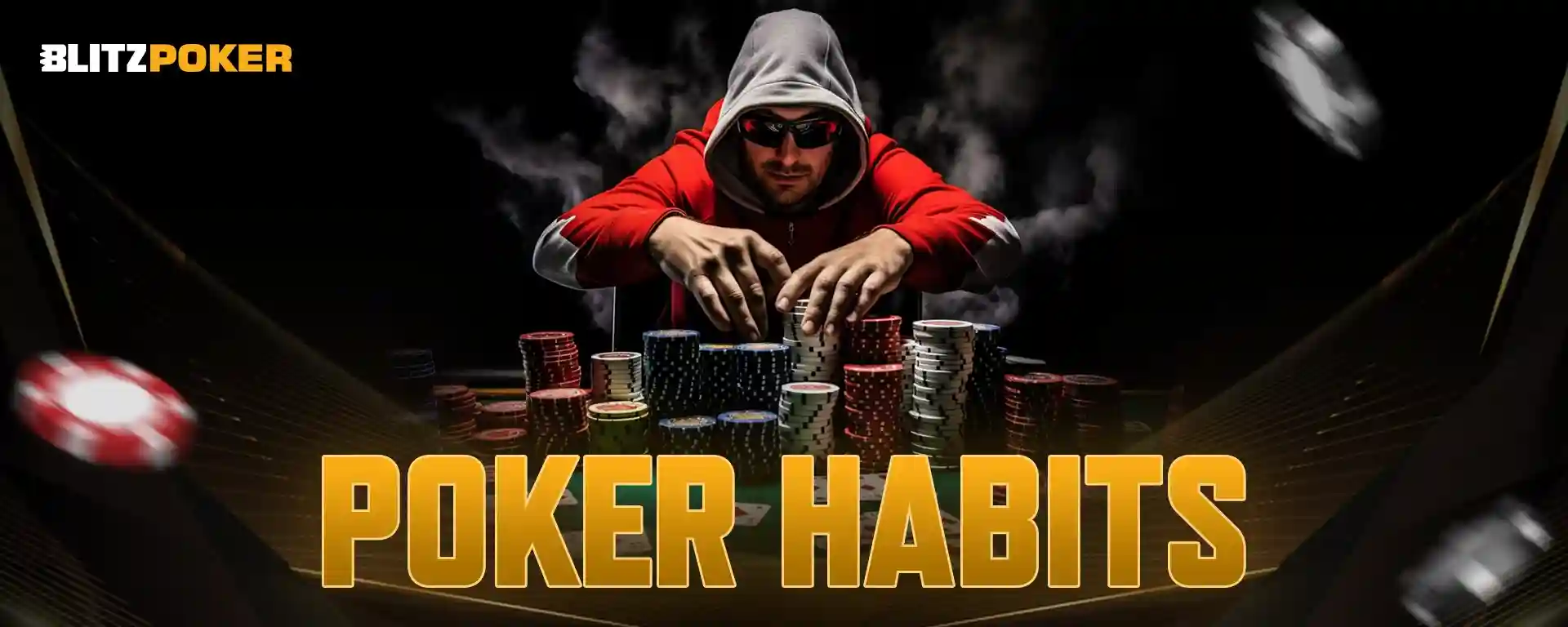Poker Habits
Poker is often seen as a game of skill. Luck might have some impact on a hand, but skilled players tend to beat less skilled ones over many hands dealt. That’s why poker is such a timeless game. It involves skills like knowing probabilities, reading opponents, managing your bankroll, and making smart choices with limited information.
The blend of skill and strategy makes poker both hard and exciting for its fans.
It’s easy to spot the bad habits that make some players lose, but what are the good habits that winners use? Or better yet: what habits do you have that help you succeed at poker?
Natural talent matters, but many good poker habits don’t need skill, just effort and determination. If you’re eager to improve your game, developing solid poker habits can help you earn more and reach your goals. Join BLITZPOKER today and take your skills to the next level on India’s best online poker platform.
Poker Habit #1: Take Breaks and Avoid Playing Poker When Tired
Long poker sessions might seem exciting, but they can hurt your game. Just like athletes perform poorly after a late night, poker players won’t perform well if they’re tired or emotional. Poker is a game of skill, and a sharp mind is crucial for success.
Cash games offer flexibility. You can choose when to play, as long as there’s a game available. Many poker rooms allow players to take breaks, even if they’ve got chips on the table. This makes it easier to play when you feel fresh. However, players often push themselves too far. If you can handle 20-hour sessions and still play well, that’s great. But if you’re tired and losing focus, it’s time to step away from the table.
Tournament players don’t have the same luxury of choosing when to play. Even if you register late, if day two begins at 10 A.M., you have to be there on time. Most players have had to play tired at some point, but you can plan ahead to avoid it. If your tournament starts early, try to get at least eight hours of sleep the night before. This way, you’ll feel refreshed and ready to perform. If nerves keep you awake, look for ways to stay alert without relying on coffee, which can make you jittery and lead to an energy crash. Green tea with lemon offers a better, steadier boost.
Taking breaks is not just important when you’re tired. It’s even more crucial when you’re tilting. Tilt can mess with your judgement and lead to bad decisions. Everyone has seen a player lose control due to tilt. Even if your opponent is weak, if you let your emotions take over, you could easily become the weaker player. If you notice yourself tilting, step away. Take a walk, cool down, and return with a clear mind. Keeping your emotions in check will help you make better choices at the table.
Poker Habit #2: Take a Moment to Pause Before Acting, Even on an Easy Fold
When we talk about poker habits, one must pause briefly before making a move, even if it’s an easy fold. Always take a couple of seconds before acting to avoid revealing how much thought you’re giving to your hand. If a decision takes longer, that’s fine, but make it a habit to allow yourself those two or three seconds every time.
Poker Habit #3:Taking Notes and Tracking Your Poker Sessions
Many low-stakes players neglect taking notes and tracking their bankroll, but these are essential for improving your game. Reviewing past hands, even losses, helps you learn and grow. Since it’s hard to remember every hand, taking notes – whether on paper or using your smartphone – is key.
Recording hands is easier than ever with mobile apps. Most players today use their phone’s Notes app, while others still prefer old-school pen and paper. Either way, making the effort to track your play will improve your game over time.
Equally important is tracking your poker sessions and bankroll. Apps like Poker Bankroll Tracker make this simple, with features like hand replays and odds calculators. With so many tools available, there’s no excuse not to keep track of your progress and improve.
Poker Habit #4: Breathe Deeply and Sit Comfortably
Deep, regular breathing helps calm your mind, making it easier to think clearly during tough decisions. Alongside this, sitting comfortably and with good posture is essential. Avoid slouching, as it not only causes discomfort but also disrupts your focus. Sit upright, with relaxed shoulders, and maintain balance for better mental clarity and long-term well-being.
Poker Habit #5: Minimise Distractions During Poker Play
Staying focused at the poker table is crucial to maintaining your edge. Watching videos or constantly using your phone may seem harmless, but it takes your attention away from the game, costing you valuable information and EV over time.
Even if you’re not in a hand, paying attention can help you pick up patterns in your opponents’ play. Missing this could lead to tough decisions later, where knowledge of past hands might have helped. For example, if you’d noticed a bluff earlier, you might make a better call in a similar spot.
Using phones and listening to music or podcasts can also affect your concentration. While some players can handle background noise, many perform better without distractions. Track your performance with and without these distractions to see what works best for you. Eliminating distractions will likely improve your game and results over time.
